人教版高中英语必修四unit4reading
高中英语必修四4_Unit4_Body_language_Reading新人教版

A conclusion of the passage.
Careful reading
( Read para1-2 Find out the answers to the questions)
1 Who will be present at the meeting?
people from different countries
a Japanese The second mistake
George Cook from (Canada)
He ________ bowed to Mr. Cook and his nose touched Mr. _________ moving Cook’s _______ ________. hand He ________ reached his hand ________ _______ ________ to the out Japanese.
Para.1-2 (example)
people present local businessmen
people representing the Chinese government
2 Why are people visiting China?
purpose mistakes
interest
People from different countries misunderstand each other.
He approaches Ms Smith Mr. Garcia by touching _______ ______ her from The _________ _______ shoulder and kissing (Columbia ) first her on the ________. cheek mistake She ______ stepped ________ back Julia Smith appearing surprised _________ from and take a few steps (Britain) away from _______ ______ Mr. Garcia.
新教材人教版高中英语选择性必修第四册Unit4 Sharing单词短语句型写作汇总

Unit 4SharingReading and Thinking ...................................................................................................... - 1 -Learning About Language ................................................................................................ - 5 -Using Language ............................................................................................................... - 7 -Reading and Thinking要点精研*Unlike students in our country, these boys do not wear cotton uniforms.不像我们国家的学生那样, 这里的孩子们不穿棉质校服。
*(2019·浙江高考)School uniforms are traditional in Britain, but some schools are starting to get rid of them.在英国穿校服是个传统, 但是有些学校正开始摆脱它们。
*For twenty minutes or so, our train seems to travel at a uniform speed.大约二十分钟的时间里, 我们的火车似乎在匀速行驶。
【语块积累】in uniform 穿制服school uniform 校服uniform speed 匀速; 等速uniform customs 统一惯例*There is no electricity, running water or even textbooks, not to mention laptops, tablets, or other modern devices.那儿没有电, 没有自来水, 甚至没有课本, 更别提笔记本电脑、平板电脑或者别的现代化设备。
人教版高中英语必修四 Unit4 Body Language reading 课件

Para1 Body language is one of the most powerful means of communication, often even more powerful than spoken language. People around the world show all kinds of feelings, wishes and attitudes that they might never speak aloud. It is possible to "read" others around us, even if they do not intend for us to catch their unspoken communication. Of course, body language can be misread, but many gestures and actions are universal.
but many gestures and actions are universal. Para7 With so many cultural differences between people, it is great
to have some similarities in body language. We can often be wrong about each other, so it is an amazing thing that we understand each other as well as we do!
Para7 With so many cultural differences between people, it is great to have some similarities in body language. We can often be wrong about each other, so it is an amazing thing that we understand each other as well as we do!
book4_unit4_reading人教版高中英语必修四第四单元
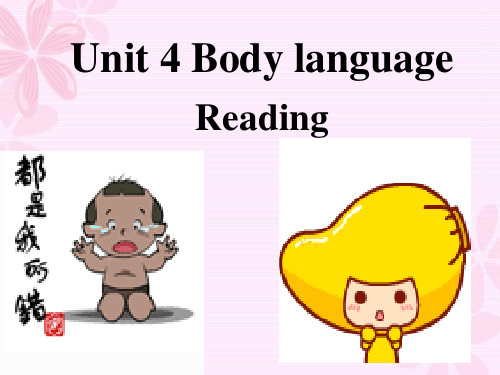
languages are bad. F
5.All members of a culture behave in the
same way.
F
TASK 3:Answer the following questions
1. Is the author of this passage male or female? How do you know ? 2.What were the two mistakes that the author noticed? 3.How can we understand “These actions are not good or bad”?
Fill in the blanks
Body language is used by people for sending messages to one another. In many countries in
the world, men k_is_s__ each other when they meet. In Britain, people usually s_h_a_k_e_ hands
think deeply
stomachache go this way
【课堂互动探究】
Look at the pictures. What are the following ways of communicating?
gesture
posture
facial expression eye contact
Para.1
ParSt.u2mmaDriizfefetrheentmsatuindeidnetas haaccvoerddiifnfegrteont (Parat.h2e-3m) eagnreinetginagndcuksetyomweorrsd. s.
人教版高中英语选择性必修第四册UNIT4 Part I (同步练习含答案)
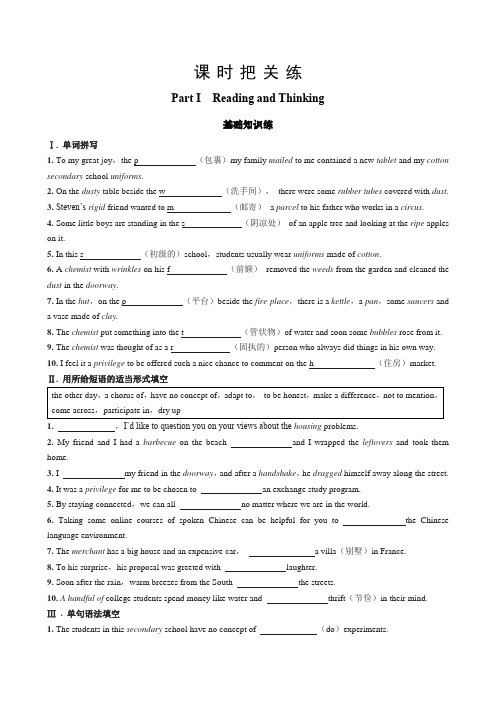
课时把关练Part I Reading and Thinking基础知识练Ⅰ. 单词拼写1. To my great joy,the p (包裹)my family mailed to me contained a new tablet and my cotton secondary school uniforms.2. On the dusty table beside the w (洗手间),there were some rubber tubes covered with dust.3. Steven’s rigid friend wanted to m (邮寄)a parcel to his father who works in a circus.4. Some little boys are standing in the s (阴凉处)of an apple tree and looking at the ripe apples on it.5. In this s (初级的)school,students usually wear uniforms made of cotton.6. A chemist with wrinkles on his f (前额)removed the weeds from the garden and cleaned the dust in the doorway.7. In the hut,on the p (平台)beside the fire-place,there is a kettle,a pan,some saucers anda vase made of clay.8. The chemist put something into the t (管状物)of water and soon some bubbles rose from it.9. The chemist was thought of as a r (固执的)person who always did things in his own way.10. I feel it a privilege to be offered such a nice chance to comment on the h (住房)market. Ⅱ. 用所给短语的适当形式填空1. ,I’d like to question you on your views about the housing problems.2. My friend and I had a barbecue on the beach and I wrapped the leftovers and took them home.3. I my friend in the doorway,and after a handshake,he dragged himself away along the street.4. It was a privilege for me to be chosen to an exchange study program.5. By staying connected,we can all no matter where we are in the world.6. Taking some online courses of spoken Chinese can be helpful for you to the Chinese language environment.7. The merchant has a big house and an expensive car, a villa(别墅)in France.8. To his surprise,his proposal was greeted with laughter.9. Soon after the rain,warm breezes from the South the streets.10. A handful of college students spend money like water and thrift(节俭)in their mind.Ⅲ. 单句语法填空1. The students in this secondary school have no concept of (do)experiments.2. She decided to major in chemistry in college because she wanted to be a (chemistry)by profession.3. Being a teacher,it is a privilege (help)students to obtain knowledge and better themselves.4. Beside the hut,colorful and exotic flowers (shade)by towering rare trees.5. This truck was heading on a (dust)dirt road,disappearing into a small valley.6. The (house)problems came up at the meeting once again yesterday.7. My friends and I have been dying (have)a barbecue for a long time.8. There’s no electricity running water and not even textbooks.Ⅳ. 练通句型【一句多译】1. 爬山者用了大约三个小时才爬到泰山顶上。
新课标人教版高一英语必修四unit4教案

新课标人教版高一英语必修四 Unit 4 教案教学目标1.了解 Unit 4 主题是“小说和电影”,并学会掌握相关词汇和知识;2.学习阅读文学作品的技巧和方法;3.提高听力和口语能力,能够听懂和表述有关电影和小说的内容;4.培养学生的批判性思维能力。
教学内容本单元的教学内容主要包括以下四部分:1.Introduction & Reading: Introducing Literature and Films2.Listening & Speaking: Films and Novels3.Speaking & Writing: Discussing Favourite Filmsnguage study: Modal Verbs教学过程Introduction & Reading1.学生们在老师的带领下,讨论并了解本单元的主题和学习目标;2.学生们分组阅读一篇有关文学和电影的文章,并在小组内讨论文章的主要观点和结论;3.整个班级讨论文章的内容,并展示各个小组的不同观点。
Listening & Speaking1.给学生播放一段电影片段,并让他们在听完后就内容进行讨论和总结;2.给学生发放一份包括电影和小说内容的练习,并让学生用口语和同桌一起完成练习。
Speaking & Writing:1.学生被分成小组,每组产生一个代表,代表需要先介绍自己喜欢的电影,并谈论电影中的某些特点和值得推荐的原因;2.所有代表回到教室,并通过细节和观点进行辩论;3.接下来,学生们需要写一篇有关一部电影、小说或者文化作品的作文,并将这篇作文与同桌进行分享和讨论。
Language study本单元的语言学习环节将主要集中在Modal Verbs语法和习惯用法上。
学生需要通过阅读和翻译文本,以及完成会话练习和语言表达作业来掌握这一难点。
教学评估1.通过小组讨论和全班讨论来听取学生的观点和意见;2.通过听力和口语练习来检查学生的听力和口语能力;3.通过作文和语法作业来检测学生对知识点的掌握情况。
新人教版高中英语必修四Unit4 Body Language Reading教学反思与心得体会
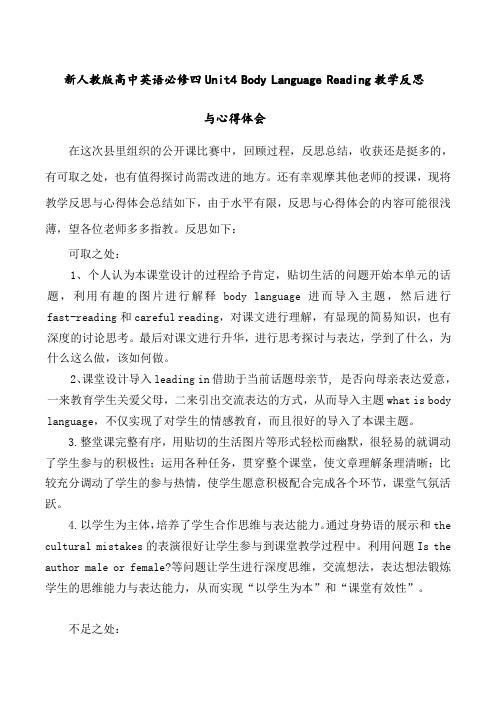
新人教版高中英语必修四Unit4 Body Language Reading教学反思与心得体会在这次县里组织的公开课比赛中,回顾过程,反思总结,收获还是挺多的,有可取之处,也有值得探讨尚需改进的地方。
还有幸观摩其他老师的授课,现将教学反思与心得体会总结如下,由于水平有限,反思与心得体会的内容可能很浅薄,望各位老师多多指教。
反思如下:可取之处:1、个人认为本课堂设计的过程给予肯定,贴切生活的问题开始本单元的话题,利用有趣的图片进行解释body language 进而导入主题,然后进行fast-reading和careful reading,对课文进行理解,有显现的简易知识,也有深度的讨论思考。
最后对课文进行升华,进行思考探讨与表达,学到了什么,为什么这么做,该如何做。
2、课堂设计导入leading in借助于当前话题母亲节, 是否向母亲表达爱意,一来教育学生关爱父母,二来引出交流表达的方式,从而导入主题what is body language,不仅实现了对学生的情感教育,而且很好的导入了本课主题。
3.整堂课完整有序,用贴切的生活图片等形式轻松而幽默,很轻易的就调动了学生参与的积极性;运用各种任务,贯穿整个课堂,使文章理解条理清晰;比较充分调动了学生的参与热情,使学生愿意积极配合完成各个环节,课堂气氛活跃。
4.以学生为主体,培养了学生合作思维与表达能力。
通过身势语的展示和the cultural mistakes的表演很好让学生参与到课堂教学过程中。
利用问题Is the author male or female?等问题让学生进行深度思维,交流想法,表达想法锻炼学生的思维能力与表达能力,从而实现“以学生为本”和“课堂有效性”。
不足之处:1. 学生思考的广度不够,阅读中停留在reading for information较多,而缺少reading for thinking,教学过程中基本上基于信息找寻的问题居多,而进行深入思考的的问题过少而且范围狭窄。
Unit 4 Sharing Reading Thinking 课文高中英语人教版选择性必修第四册

宾语从句。
let alone
需跟与前面相同的平行结 Today, some young
构。用在否定句后,表示 people never even read
由于极可能发生的事情都 没有发生,某种情况就更
a newspaper, let alone
不可能了。
a book.
【语境应用】用let alone或not to mention完成句子。 1) They have three dogs to look after, __n_o_t__to__m_e_n_t_i_o_n_/_
some sweets and jam from home; I’ve
been dying to have some of my
be dying to do sth ቤተ መጻሕፍቲ ባይዱ望做某事
favourite sweets, and it’s always nice to
get mail!
1. I’ve been dying to have some of my favourite sweets, and it’s always nice to get mail!
我一直非常渴望吃一些我最喜欢的糖果,而且 收到邮包总是令人开心不已。
be dying for / to do sth: to be extremely eager to have / do sth 极想得到,渴望得到,渴望做某事
eg I’m dying to hear your news. I’m dying for something to eat.
➢ in chorus all together; in unison
同时;一起
eg There was a chorus of agreement from the committee.
高中英语人教版必修四unit4_Body_language-reading公开课课件ppt课件

Part 3: (Para 4 )
Part 4: (Para 5)
D) Examples of learned or cultural “body language”.
Matching the people and the different ways of greeting (para2&5)
Tony Garcia (Columbia) Julia Smith (Britain) Akira Nagata (Japan) George Cook (Canada)
Careful reading :
shakes hands and kisses others twice on each cheek Bows
shakes hands approaches others closely and touches their shoulder and kisses them on the cheek does not stand very close to others or touch strangers
Columbia
Britain
Julia Smith
George Cook Akira Nagata
Canada
Japan Jordan
Ahmed Aziz
Darlene Coulon
You
France China
Fast reading:
Which is the main idea of the text?
reading
Come here !
Good ! / Great !
“No,You can not do that"
OK
• She is deaf and dump, so body languagee.
Unit-4-Reading-and-thinking-教案--高中英语人教版选择性必修第四册
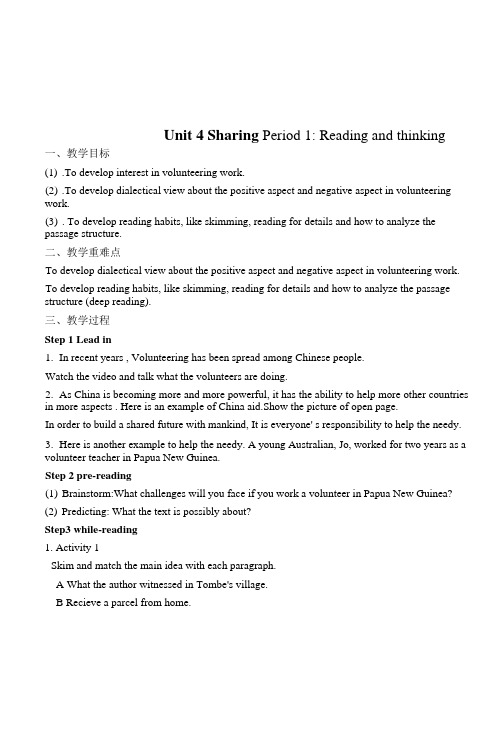
Unit 4 Sharing Period 1: Reading and thinking 一、教学目标(1).To develop interest in volunteering work.(2).To develop dialectical view about the positive aspect and negative aspect in volunteering work.(3). To develop reading habits, like skimming, reading for details and how to analyze the passage structure.二、教学重难点To develop dialectical view about the positive aspect and negative aspect in volunteering work. To develop reading habits, like skimming, reading for details and how to analyze the passage structure (deep reading).三、教学过程Step 1 Lead in1.In recent years , Volunteering has been spread among Chinese people.Watch the video and talk what the volunteers are doing.2.As China is becoming more and more powerful, it has the ability to help more other countries in more aspects . Here is an example of China aid.Show the picture of open page.In order to build a shared future with mankind, It is everyone' s responsibility to help the needy.3.Here is another example to help the needy. A young Australian, Jo, worked for two years as a volunteer teacher in Papua New Guinea.Step 2 pre-reading(1)Brainstorm:What challenges will you face if you work a volunteer in Papua New Guinea?(2)Predicting: What the text is possibly about?Step3 while-reading1. Activity 1Skim and match the main idea with each paragraph.A What the author witnessed in Tombe's village.B Recieve a parcel from home.Would you like to become a volunteer teacher? Why or why not?四、教后反思(不少于100字)。
Unit 4 Reading for Writing语言点(课件)高中英语人教版选择性必修第四册

14
5. Today, I want to relay to you that I'm proud of the work my mother has done, and I am now supportive of it.
今天我想告诉你们的是,我为我妈妈所做的工作感到骄傲,我现在也
我母亲还到农村巡 回治疗,帮助残疾人,为当地医生提供咨询和 培训。
n. 咨询;咨询会
consult vt.咨询;请教;查阅;商量 ✓concosunlstualnttsbn.. a顾b问ou;t/高on级s顾th问. 关医于师某,事会请诊教医/师咨;询咨某询人者 ✓ consult with sb about/on sth. 与某人协商某事 ✓ consult the dictionary 查字典 ✓ consult....for... 为······查阅(词典、参考书等)
is wet.
③ ____A__s____it was late, we came back soon. ④ We can't go out______b_e_c_a_u_s_e_____ it is too cold.
单句语法填空 Exercise
1. She__h_a_s_r_e_tu_r_n_e_d__(return) from India lately.
我们都想当然地认为他们已经完成了他们的任务。
3) Human beings __to_o__k_it__fo_r_g_r_a_n_t_e_d__ (以为它理所当然) that their brains held all the solutions, but maybe their hearts can be a better guide.(2019江苏高考)
新课标人教版必修四Book4 Unit4 Reading
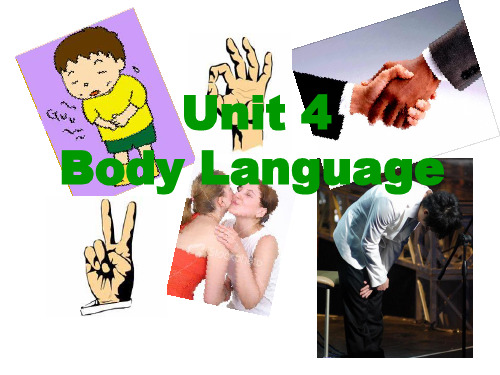
Ways to greet each other Approach others closely and are more likely to touch them. Shake hands, do not stand very close to others or touch strangers when they meet. Bow Shake hands. Shake hands and stand quite close to other men. Nod to women but do not shake hands with them.
我的课堂我做主
Assignment(任务分配)
Group1. → Question (3,4). Group2. → Question (5). Group3. → Question (1). Group4. → Question (2). Group5. → Question (6). Group6. → Question (7).
Japan: bow
Some western countries: hug
Russia, France, Arab: kiss
Reading
Communication:
No problem?
Learning aims
• 1、To learn some new words and phrases. • 2、To know different body languages represent different meanings. • 3、To respect other country’s body languages.
Why do we need to study body language?
人教版选择性必修第四册Unit4 Reading and Thinking
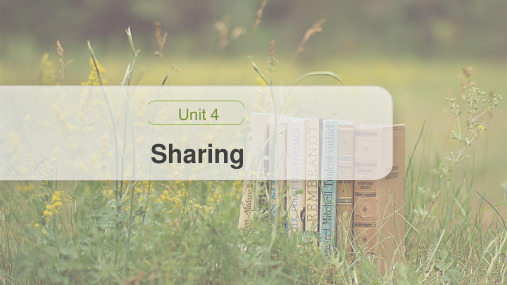
[名师点津] not to mention“更不用说”,相当于一个插入语,但其后所接 的词的形式要求与前面的词平行一致,一般用于否定句之后。表达“更不用 说”的短语还有:①let alone ②not to speak of。
Sometimes I wonder how relevant chemistry is to these students—few
(1)I’ve heard that,in the Sahara,there is no shade during the day,and the stars seem especially brilliant on clear nights. 我听说在撒哈拉,白天没有阴凉之处,在晴朗的夜晚星星看起来格外灿烂。 (2)Water is usually warmer in direct sunlight than in the shade . 水通常是在阳光直射的地方比在阴凉处温度高。 (3)Its long branches and leaves shade them from/against the sun. 它长长的树枝和树叶为他们遮挡了阳光。 (4)I saw that merchant sitting under the shade of a tree,reading a book. 我看见那个商人坐在树荫下读书。
Unit 4
Sharing
内容索引 Period Two Reading and Thinking—Language Points
1. parcel
2. jam 3. mail
4. clay 5. weed
基 础 自 测 自主学习 落实基础知识
n.包裹 vt.裹好;打包 n.果酱;堵塞 n.邮件;信件;邮政 vt.邮寄;发电邮给 n.黏土;陶土 n.杂草;野草 vt.& vi.除杂草
高中英语必修四unit4Reading

Unit 4 Reading Communication: No problem?
Brainstorming
1. What is the purpose of language? The purpose of language is to communicate with other people.
1. Englishmen often stand close to others or touch strangers as soon as they meet. F
2. Most people around the world F now greet each other by kissing.
George Cook (Canada)
Julia Smith (Britain)
Tony Garcia (Columbia)
First-reading
I. While reading, please try to divide the whole passage into several parts and find out the main idea. Part 1. (Para. 1) Meet the visitors at the airport.
Part 4. (Para. 5) Summary of body language.
II. How do different international students behave when they greet people? Complete the chart with information from the passage.
3. There are many different ways to greet someone using words. How many ways can you think of to greet someone if you cannot speak?
高一英语必修四_unit4__reading课件

Unit 4 Body language •What do you think the purpose of language?•How can you communicate with someone if you cannot speak?•How many ways can you think of to greet someone if you cannot speak?Communication: No problem?•Step1. fast reading•1) What is the main idea of the text?2) How many parts can we divide the passageinto?3) What’s the main idea for each part?•1) What is the main idea of the text?–The passage introduces some examples of cultural body language when greetingpeople.•2) How many parts can we divide the •passage into?–Part 1 (para. 1)–Part 2 (para. 2 and 3 )–Part 3 (para. 4 and 5 )3) What’s the main idea for each part?Part 1 (para. 1)We are sent to Capital International Airport to meet some international students.Part 2 (para. 2 and 3)Examples of learned or cultural “bodylanguage”.Part 3 (para. 4 and 5)Different people have different physical ways to greet others. Learning about their customs can help avoid difficulties in communication.Step 2. Scan the text and find outCountry / Area Ways to greet each otherBritain Shake hands. Do not stand very close to others or touchstrangers when they meet.Canada Shake hands.Japan Bow.Spain, Italy, SouthAmerican countriesApproach others closely and are more likely to touch them. France Shake hands and kiss each other twice on each cheek.Middle East, some Muslim countries Shake hands and stand quite close to other men. Nod to women but do not shake hands with them.Name Description Body language To whom Tony Garcia man from Colombia Kiss on the cheek everyoneJulia Smith woman from Britain no touching everyoneAkira Nagata man from Japan bowing everyone George Cook man from Canada shaking hands everyoneAhmed Aziz man from Jordan shaking handsnodding to manto womanDarlene Coulon woman from France shake hands and kisstwice on each cheekpeople she knowsStep 3. use the passage to help you answer the following questions1) Is the author of this passage male or female? How doyou know?The author is male. Ahmed Aziz will not shake hands with women, but he shakes hands with the author.2) What were the two mistakes that the author noticed?He noticed that the Colombian man kissed theBritish woman, but in her culture, a kiss from astranger is not expected. He also noticed that theJapanese man bowed just as the Canadian manstarted to shake hands, so one man’s nosetouched the other man’s hand.•3)Who seemed to prefer to keep more physical diastance from others? Who seemed to prefer closer physical distance ?•The British woman, Julia and probably the Canadian man, George, seemed to prefer to keep more physicaldistance from others. The Colombian man, Tony, and the Jordanian man Ahmed, seemed to prefer closer physical distance.•4) Did any students have similar greeting customs? If so, which one?•Yes. Tony from Colombia and Darlene from France had a similar greeting custom —a kiss. George from Canada and Ahmed from Jordan also had a similar greeting custom —a handshake, but Ahmed shakes hands only with men.•5) “When in Rome, do as the Romans do.”What do you think this famous saying means?•This saying means that when we are in a certain place, we should follow the customs of the people who live in that place, not our own customs.•6) Do you agree with the author’s statement that body language is not good or bad? Why or why not?Step 4. summaryStep 5. translation1.The first person to arrive was TonyGarcia, closely followed by Julia Smith from Britain.2. Not all cultures greet each other thesame way, nor are they comfortable in the same way with touching or distance between people.3. However, people from places like Spain,Italy or South American countriesapproach others closely and are morelikely to touch them.Step 5. homework •Complete p.27 Exercise 3。
